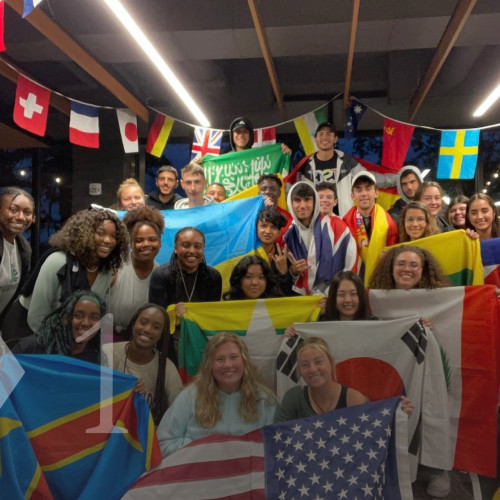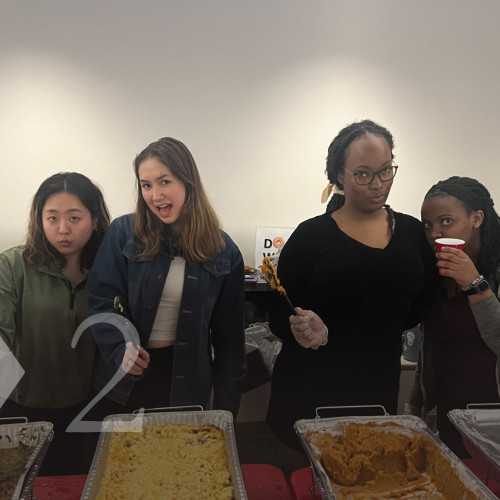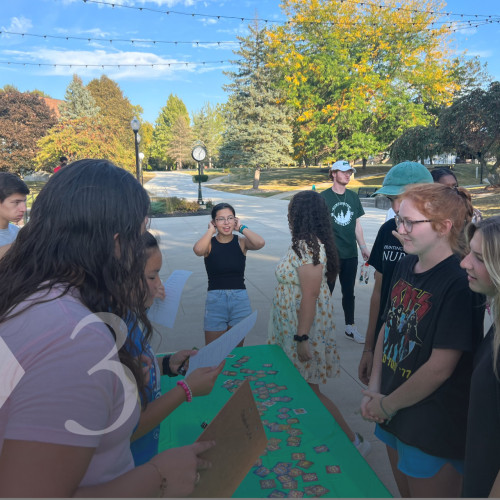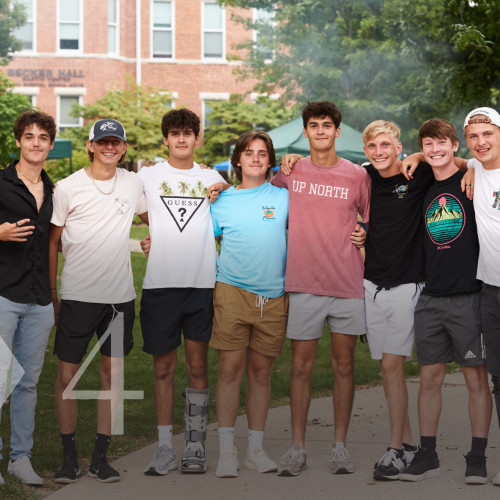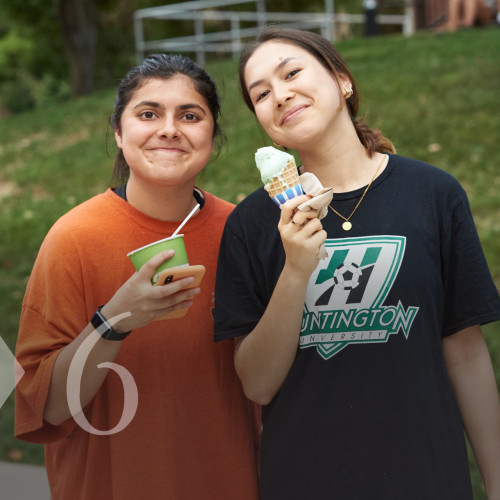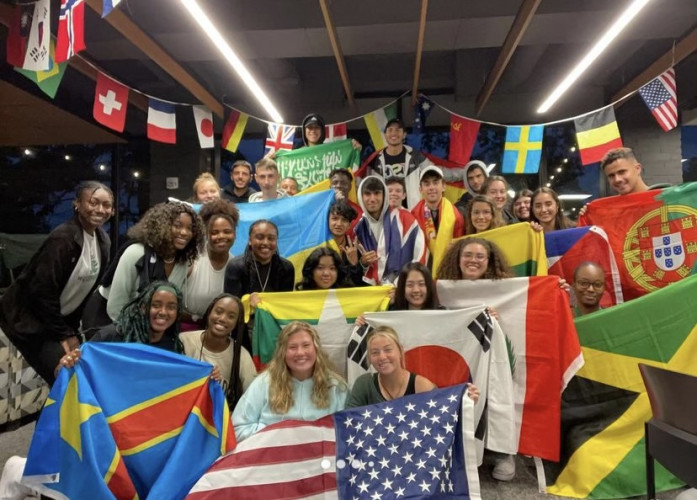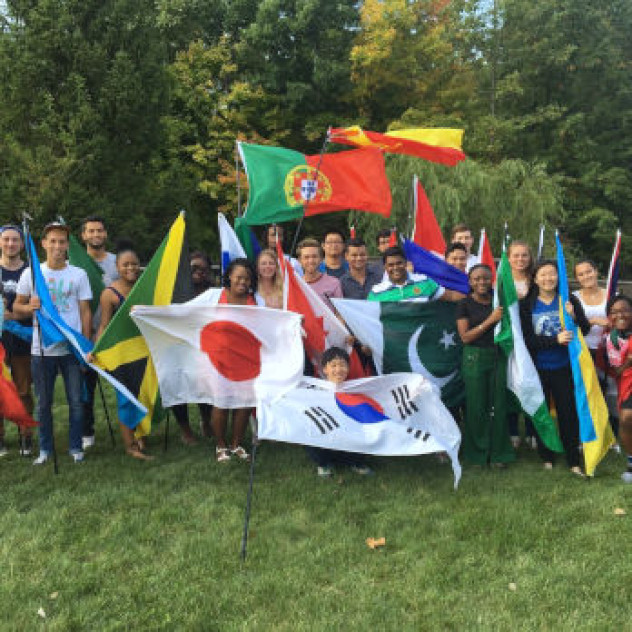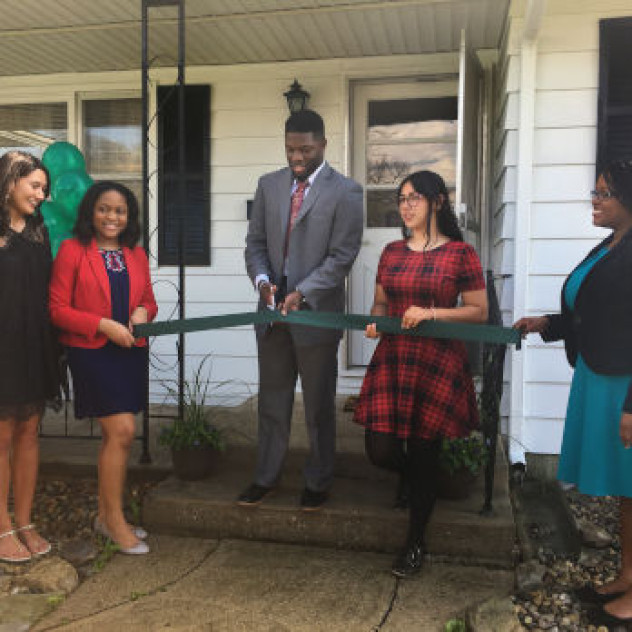We are here to help you every step of the way!
Applying to a school in another country can be a daunting task, but we are here to help you every step of the way. If at any point you have a question, you can always reach out to our International Admissions Team for help.
Step 1: Application
Step 2: Transcripts & English Proficiency
Step 2.1: Submit Transcripts
Step 2.2: Take English Proficiency Exam
Step 3: Scholarships & Financial Aid
Step 3.1: Explore Scholarship Opportunities
Step 3.2: Receive and Review Your Financial Aid Offer
Step 3.3: Send Proof of Funds
Step 4: Make Your Deposit
Step 5: Obtain I-20 Certificate of Eligibility and F1 Student Visa
Step 5.1 - Fill out the I-20 Information Form
Step 5.2 - Start Your F-1 Visa Process
Step 6: Complete HU Forms for Campus Life
Step 7: Make Your Travel Arrangements
Huntington University requires an official transcript which has been converted to the US grading scale. This is because we require your high school GPA equivalent to meet or exceed 2.3 on a 4.0 on the US grading scale. Students who are transferring from a post-secondary institution must meet or exceed a 2.0 GPA on a 4.0 scale.
You can submit your Official Transcript for evaluation through one of these sites:
Transcript Evaluation Service | Evaluation Type | Cost | Student Population |
|---|---|---|---|
Basic High School Evaluation | $95 for initial application $45 to update | Any student-athlete who has not completed post-secondary coursework. | |
Course-by-Course Evaluation | $190 for initial application $80 to update | Any student-athlete who has completed post-secondary coursework. | |
WES Basic Course-by-Course Evaluation | $170 | Students who are not athletes and either have or have not completed post-secondary coursework. | |
ECE General with GPA Report | $130 | Students who are not athletes and have not completed any post-secondary coursework. | |
ECE Course-by-Course | $195 | Students who are not athletes and have completed post-secondary coursework. |
*Note: If you are transferring from a US-based post-secondary institution or high school, you may not need to use the above service(s) to process your transcript. Contact your admissions counselor for more information.
Take one English Proficiency Exam and submit your score:
English Proficiency Service | Type | Cost | Requirement |
|---|---|---|---|
Test of English as a Foreign Language | $180-$200 | Score required: 75 or above | |
International English Language Testing System | Varies | Score required: 6.0 or above | |
Language App | Around $50 | Score required: 105 or above | |
Standardized test used in the USA | Around $60 | English score of 500 or above |
Scholarship Opportunities
Unfortunately, international students are not eligible for USA government, state, or county scholarships. But there are a number of scholarship opportunities that can help you cover the cost of your tuition*:
Transfer and Freshmen Students | ||
|---|---|---|
We can’t wait to meet you to learn more about your interests and future goals! We’d like to take you on a virtual HU campus visit, answer any questions you might have, and share information about life as an HU international student. | ||
ONE-TIME AMOUNT | ELIGIBILITY REQUIREMENT | |
VIRTUAL CAMPUS | $1,000 | Meet via Zoom for Virtual Campus Visit |
Freshman | ||
|---|---|---|
Freshman Academic Awards are based on the student’s high school GPA. All regularly admitted freshmen will receive one of these awards without any additional application. | ||
ANNUAL AMOUNT | ELIGIBILITY REQUIREMENT | |
PRESIDENT'S SCHOLARSHIP | $15,000 | GPA: 3.95 and above |
DEAN'S SCHOLARSHIP | $13,000 | GPA: 3.6-3.94 |
FACULTY SCHOLARSHIP | $12,000 | GPA: 3.3-3.59 |
TRUSTEE GRANT | $10,000 | GPA: 2.9-3.29 |
MERILLAT GRANT | $6,000 | GPA: 2.89 and below |
*Academic Awards are renewable for a total of eight semesters. Renewal requirements is Satisfactory Academic Progress. The scholarships do not apply to room and board. The eligibility and amounts listed above are only applicable to incoming freshmen in the 2025-2026 academic year. | ||
Transfer | ||
|---|---|---|
| Transfer Academic Awards* are available to students who will have at least 12 earned credit hours and are at least one semester removed from high school. Our Transfer Academic Award maximum is $14,000 per year. Transfer students who wish to be reviewed for an Academic Award must send official college transcripts to Huntington University. HU will award transfer students the highest academic scholarship for which they qualify based upon their college transfer cumulative GPA. | ||
ANNUAL AMOUNT | ELIGIBILITY REQUIREMENT | |
DISTINCTION SCHOLARSHIP | $14,000 | 3.5 Cumulative College GPA |
HONORS SCHOLARSHIP | $12,000 | 2.8-3.49 Cumulative College GPA |
TRANSFER GRANT | $10,000 | 2.0-2.79 Cumulative College GPA |
| *Academic Awards are renewable for a total of eight semesters. Renewal requirements is Satisfactory Academic Progress. The scholarships do not apply to room and board. The eligibility and amounts listed above are only applicable to incoming freshmen in the 2025-2026 academic year. | ||
Forester Fund | ||
|---|---|---|
ATHLETIC SCHOLARSHIPS | Varies | Recruited student athletes. |
HUNTINGTON UNIVERSITY ALUMNI GRANT | $1,500 | Student must be a dependent of a Huntington University/Huntington College graduate. |
MATCHING CHURCH GRANT | Up to $1,000 | HU will match up to $1,000 in scholarship from the student’s local church. Scholarship commitment must be submitted by August 1. View the Matching Church Grant PDF for more details. |
CHURCH SERVICE GRANT | $1,000 | Student is a dependent of a full-time minister or missionary. |
INTERNATIONAL GRANT | Up to $5,000 | Must complete International Grant application and demonstrate need. |
HUNTINGTON UNIVERSITY UNITED BRETHREN GRANT | $4,000 | Student regularly attends and is involved with a United Brethren in Christ Church. |
UNITED BRETHREN INTERNATIONAL STUDENT CHRISTIAN LEADERSHIP SCHOLARSHIP | Full Tuition | International students who would like to apply for this scholarship should complete and submit the scholarship application form by March 1st. |
| PERFORMANCE AWARDS | Varies | Based upon recommendation of art, communication, digital media arts, english, music, or theatre faculty. Visit the Department and Performance Awards page for more details. |
*Academic Awards are renewable for a total of eight semesters. Renewal requirements is Satisfactory Academic Progress. The scholarships do not apply to room and board. The eligibility and amounts listed above are only applicable to incoming freshmen in the 2025-2026 academic year. | ||
*Not all scholarships/grants stack on one another. The financial aid office determines final financial aid packets.
Financial Offer
Upon review of the scholarships and grants you qualify for, our Financial Aid Office will create your Financial Aid Offer. In this offer, you will find an estimated cost for your academic year. Take time to review your Financial Aid Offer, and contact the Financial Aid Office with any questions.
Call: (260) 359-4326 or Email: finaid@huntington.edu
Proof of Funds
At the beginning of each semester, you are required to pay what you owe in full for the semester. Knowing this, we require proof of funding from you to determine if you can financially cover the cost of attending HU.
It can be multiple outlets, but the point is to demonstrate your ability to pay the tuition cost. This can be done by emailing us your bank statement, which needs to be from within the past six months, certifying the amount in the account is enough to cover tuition and living costs for the year.
Add a copy of your passport and a copy of your bank statement to the I-20 form. Remember that the proof of funds needs to be from the past six months showing that the available amount in the account is equal or higher to cover tuition and living costs for the year.
Since wait times vary greatly and even change weekly, ensure you know the estimated wait time at the U.S. Embassy near you! Here is a link to check the wait times. The following links will help you through the Visa process:
Complete the online DS-160 Nonimmigrant VISA Application (Be sure to have your I-20 form and passport with you.)
Schedule your F-1 Visa interview at the U.S. embassy closest to you. For your interview, be sure to take the following documents with you:
Passport
I-20 (Official)
SEVIS fee receipt
Acceptance Letter from HU
Bank Statements for your studies
Proof of documentation that you will return to your country after you finish your program.
* If you are a transfer student from a US college or university, you do not need to schedule any appointment or go through an interview for a new visa. You must contact the DSO at your current school and request that they release your current SEVIS Record. Keep in mind that you need to be inside the United States to make the transfer of your SEVIS record. If you are outside the US while the transfer is being made, you will need to pay the SEVIS record again.
** When visiting the above websites, be sure to use the information relevant to your home country for a smooth Visa process.

